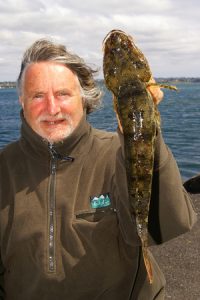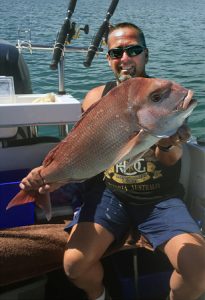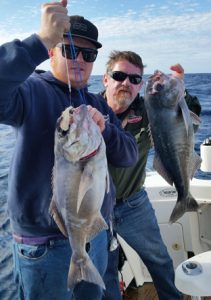
Martin de Lange with the rock flathead he caught at Limeburners Point.
Corio Bay/Bellarine Peninsula
After catching several Australian salmon for bait on Saturday, Murray and Linda Stewart anchored offshore from the old Alcoa site at Point Henry, hopeful of catching a snapper.
A good move as it turned out, for at 11.30 am, Murray caught a nice one that later weighed 6.5 kg. Following that, Linda hooked a similar size fish which unfortunately, fouled her line on the outboard’s propeller and escaped.
A strong southerly breeze early last week discouraged most anglers, but Martin de Lange, who was the sole angler fishing from the outer wall of Limeburners Point breakwater, caught a rock flathead over a kilogram using mussel for bait.
Bellarine Peninsula locals, Noel and Kirt Brehan, could have been accused of seeking greener pastures, after first launching at Clifton Springs before heading to Altona where they had been told that snapper were on the bite.
Initially they had no luck at all, but after heading out into deeper water they hit pay dirt catching four snapper to 4.5 kg, which provided a degree of dignity for their long journey.
With an improvement in the weather last week, Mike Windsor of Clifton Springs Boat Hire reports that flathead from legal size to 45 cm were caught in good numbers with Kane Kline and his son Ryder among the successful anglers. Rachel Spiteri and her Dad also caught flathead and picked up a gummy shark or two out toward the No 10 Wilson Spit channel marker.
Squid have been on offer said Mike, but whiting have been scarce. Never the less Simon and Felicity Roberts caught several, along with some legal size pinkies, offshore from Point Wilson.
Also successful were whiting aficionados Andrew Johnson and Dennis O’Brien who took a respectable bag of 30, along with two good size flathead, in 3.5 metres of water off Curlewis, but only after making a number of unsuccessful moves.

Murray Stewart with his snapper from Corio Bay (Picture: Linda Stewart).
Indented Head
The Indented Head Boat Ramp is currently closed as extensive refurbishments have begun. How long the process will take is hard to say, but current estimates are that it will probably be two months or so before this facility is in use again.
Barwon Heads
After catching a number of mullet to use as live bait on Saturday, Simon Werner and Jake Callahan headed upstream from the Sheepwash, hopeful of catching a mulloway or two toward the high tide: Not in vain as it turned out for they caught four from 70 to 80 cm, releasing two and keeping one each.
Freshwater
John Clements of the Lake Purrumbete Holiday Park reports that redfin are still on the go and putting smiles on the faces of folk like Winchelsea’s George Gillies who had the time of his life catching redfin to a kilogram or so while out on the lake with John.
Others to do well include Joe and Kurt Rundell from Albion, Ashley Cadwell from Geelong and Dorian Do and Jennifer Ho from Clayton, the majority of whom fished with live minnow at the bottom while others used a variety of lures including Nories Power Shad, Wasabi spoons and various soft plastics.

Ben Johnson and Lockie Wombell with a sample of their blue eye trevalla catch. (Picture: Bob McPherson).
Portland
Taking advantage of good weather last week, Bob McPherson, along with Ben Johnson and Lockie Wombell, were onto the blue eye trevalla in around 500 metres of water when the retrieve came to a sudden halt and line began peeling from the reel.
Bob said, that it’s quite common for fish to be taken from the line on the way up, but – whatever this was – must have become entangled in the line because it was 15 minutes or so before they were able to break it free.
Ken asks:
Geoff, reading you book “Bream, Flathead and Mulloway,” I was intrigued by your mention of building of a tea tree bough to catch spider crabs within estuaries. Once built, do you have to bait it?
Ken, they are called tea tree boughs but a collection of any small branches up to 1.5 cm in diameter, along with some large stones within to sink it, can be bound together to form a cylindrical bundle or bough some 20 cm in diameter and perhaps 60 cm in length.
The bough is then wrapped in chicken wire, which is secured with cable or wire ties. This is to provide sufficient rigidity to the bough when shaken, end first, into a bucket to release the crabs that have gone inside for protection from the fish you are seeking.
Baiting the bough is not necessary, but the line running from the bank down to the bough’s hauling line should be totally unobtrusive, otherwise your good work will benefit opportunists, who unfortunately, are constantly on the lookout for such benefits.
